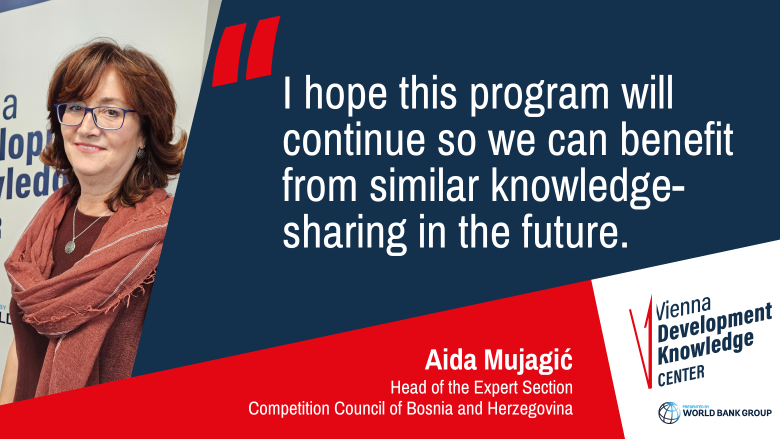Cooperation in the Western Balkans took a step forward with the first meeting of an informal network of competition authorities at a Vienna Development Knowledge Center event aimed at supporting economic integration and sustainable growth in this pivotal part of Europe.
Jointly organized by the World Bank and the Austrian Federal Competition Authority, the May 26 workshop brought together representatives from peer institutions in Albania, Bosnia and Herzegovina, Kosovo, Montenegro and North Macedonia for inspirational exchanges.
Strengthening competition oversight is more than a regulatory exercise – preliminary estimations show that increasing competition in high-risk industries could actually raise productivity growth by an average of 5 percent per year in the Western Balkans.
Yet gaps in enforcement and cooperation still limit progress. The new network aims to shift that dynamic by turning peer exchanges and learning into shared momentum, building on the successful experience of the European Competition Network. It will also help facilitate a forward-looking reform agenda in the competition space and identify effective ways to strengthen cross-border and international cooperation.
“A close relationship with our partners in the Western Balkans is not just a simple necessity, it’s a strategic investment into the future of our continent,” Austrian Minister for Europe, Integration and Family Claudia Plakolm told the gathering, which also drew the OECD and other experts, via video message.
Following remarks by Harald Waiglein, Director General for Economic Policy and Financial Markets at Austria’s Finance Ministry, the World Bank’s Europe and Central Asia (ECA) Region Practice Manager Martha M. Licetti set the stage, underscoring the need for both action and cooperation across borders and institutions.
Weak competition keeps prices high, stifles innovation and limits growth. Meanwhile, restrictive regulations in key input sectors like energy, telecoms and professional services – coupled with uneven enforcement – continue to undermine the potential of more open, dynamic markets.
“You are the champions of competition across the region,” Licetti noted. “But clearly, for competition to actually develop across markets you need cooperation with other regulators, including the financial authorities, and this is something, hopefully, we can achieve together.”
Boosting competition could yield substantial productivity gains while low cartel detection highlights ongoing risks of potential anti-competitive practices in the region, Licetti added.
Lukas Cavada, Executive Director for International Affairs at the Austrian Federal Competition Authority, summarized the Austrian experience at the European Competition Network, a model for the Western Balkans engagement, as “one that respects diversity but speaks with one voice when it comes to core values: to ensure markets remain fair and open.”
Regulators play important role
After delving into tools to strengthen interinstitutional cooperation on transnational merger cases, financial regulators and ministries of finance from the Western Balkans and other ECA countries joined competition authorities for a session on competition and financial stability with keynote comments by Philip Marsden, Deputy Chair of the Enforcement Decision Making Committee at the Bank of England.
“Competition in the financial sector is one of the most important yet difficult issues at hand, which can be tackled only through effective dialogue,” said Armen Nurbekyan, Deputy Governor of the Central Bank of Armenia. “The workshop offered a rare opportunity for competition authorities and regulators to exchange views.”
Anti-cartel enforcement
As a first capacity-building activity of the new network, the Vienna Development Knowledge Center and the Austrian Federal Competition Authority followed up their May 26 workshop with a joint training session on anti-cartel probes a day later.
In opening remarks, Austrian Federal Competition Authority Director Natalie Harsdorf highlighted the significance of skilled action to stop cartels by outlining how they harm consumers, choke innovation, erode public trust in markets and even impact democracies.
“This session was very important and valuable for me because we have a limited staff training budget,” said Aida Mujagić of Bosnia and Herzegovina’s Competition Council. “I hope this program will continue so that we can benefit from similar knowledge-sharing in the future and my colleagues will also get the opportunity to participate.”

The workshops took place on the margins of the May 27-28 World Bank Financial Sector Advisory Centre’s (FinSAC) “Financial sector stability in times of geopolitical turbulence” international conference.
“After two intensive days of work and meetings in Vienna, we leave with a positive feeling of a promising start in building a Balkan community of competition policy and law professionals,” said Denar Biba, Chairman of the Albanian Competition Authority. “Let’s not lose momentum.”


